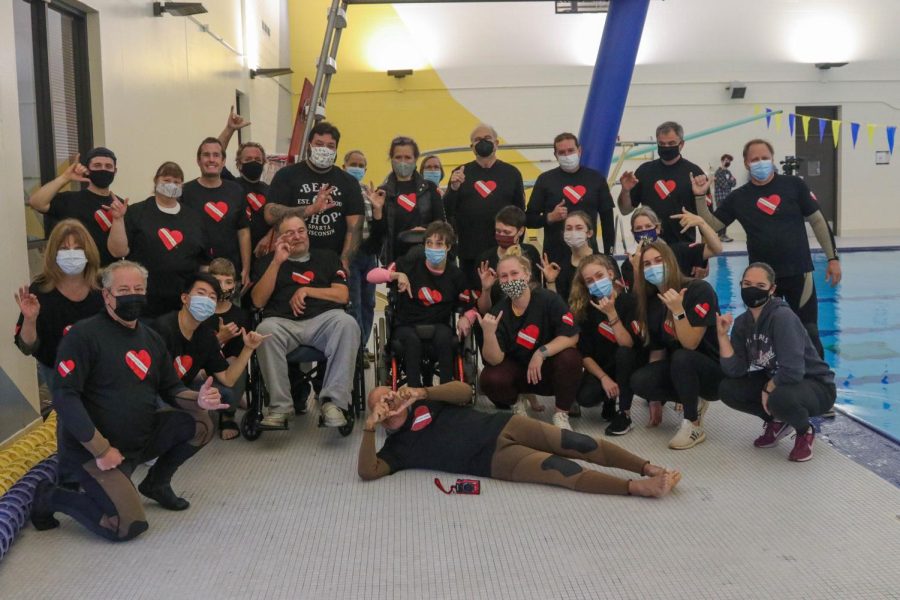#scuba A deep dive into service – Marquette Wire – Marquette Wire
[ad_1] Watch as the Marquette Rec Center Pool transforms into a synthetic ocean experience. Thanks to Adaptive Abilities and Diveheart, Milwaukee community members have the chance to take a deep dive on the scuba diving experience. Adaptive Abilities at Marquette gives people with disabilities or injuries the chance to experience something they never would’ve been able to.
[ad_1]
Watch as the Marquette Rec Center Pool transforms into a synthetic ocean experience. Thanks to Adaptive Abilities and Diveheart, Milwaukee community members have the chance to take a deep dive on the scuba diving experience.
Adaptive Abilities at Marquette gives people with disabilities or injuries the chance to experience something they never would’ve been able to. Adaptive Abilities works with Diveheart, a non-profit organization on giving participants the chance to scuba dive all while remaining comfortable.
Together they work to build confidence, independence and self-esteem all through going scuba diving. Scuba therapy provides rehabilitative and therapeutic benefits.
Scuba therapy can improve the mental and physical conditions of people. Diving can help improve state-of-mind and our self perception. Diving can also improve social skills as they are working with others in making the opportunity possible.
“This opportunity give people a chance to step out. It’s a huge quality of life or a lot of people and it builds a huge community. Not just through volunteers but through the participants,” Kristen Jordens, a graduate student in the College of Health Sciences, said.
Being underwater puts divers all on the same wavelength. Going under the water can release the pressure and gravity, being underwater gives people with disabilities the chance to try a new range of motion that wasn’t possible on land.
First it starts with plenty of time for preparation and organizing, John Lighthart, a senior in the College of Health Sciences, said. Such as reaching out to Diverheart and finding volunteers who are interested.
“We have been here for about a couple of hours making sure everything is ready to go,” Lighthart said. “We’ve unloaded the truck with all the equipment and now we are laying out all the gear and tanks for use.”
Volunteers at the event had a variety of tasks to carry out. Some prepared equipment, some helped transfer participants into the water and others got to dive down into the water with them.
“Many of the same people come every single week and since I’ve been doing this for years it’s all folks that I know and you get relationships with them. You get excited when they come back into town,” Jordens said.
Not only does this offer an opportunity for the divers to learn about the experience, but it also offers volunteers first hand experience in working with those that have disabilities.
“Getting an exposure to different sort of neurological injuries and presentations has helped me as I’ve gone through school. Also some of the hands-on skills, like learning hope to talk to people and asking people how we can help,” Jordens said.
When doing things out of people’s comfort zones it is important to have as much communication as needed, whether through verbal or non verbal language, Jordens said. The communication starts from the moment they walk in the door until they exit the event.
“Making sure people are comfortable is the most important thing. Giving people this opportunity is an amazing experience, but if they aren’t comfortable with it, it’s not worth it. So the number one priority is that they are safe and having a good time,” Audrey Duetsch, a first-year in the College of Health Sciences, said.
Jordens said that making sure the participants are safe is the most important part, and Adaptive Abilities does a lot of work to make sure.
While going into the water they are slowly lowered through a chair on the side of the pool. While entering the pool they are greeted by volunteers who catch them and get them situated with the water. Then they are taught the submerging technique, and before you know it they are under the water.
“Anyone can do this event, that’s what I tell all the participants that are nervous … everyone that goes down goes with a dive buddy. Anyone can learn how to breathe and scuba dive, I believe that strongly,” Jordens said.
The next session will be held Dec.4.
This story was written by Connor Baldwin. He can be reached at connor.baldwin@marquette.edu
Adblock test (Why?)
[ad_2]
Source link








Comments